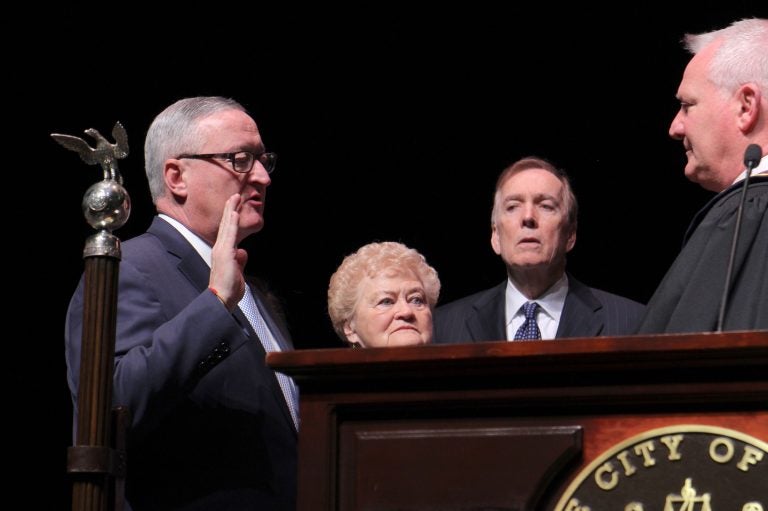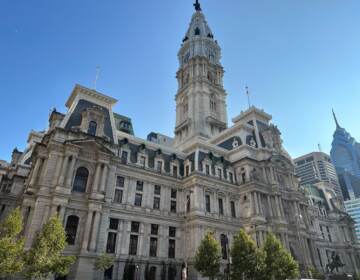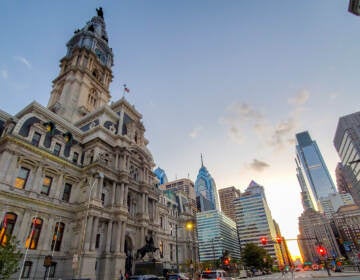Mayor Kenney starts second term with vow to address gun violence, racial and economic inequality
Kenney opened his second term with an emotional call to solve deep challenges and a promise to improve city services, including bringing back citywide street sweeping.

Mayor Jim Kenney is sworn in to his second term, flanked by his mother, Barbara. (Emma Lee/WHYY)
Philadelphia Mayor Jim Kenney opened his second term with a call to address “unspeakable” gun violence plaguing the city and confront deep racial and economic inequalities. He also pledged to bring back street sweeping by the end of his four-year term and improve other city services.
The inauguration was held at the recently reborn historic Metropolitan Opera House on North Broad Street, a venue seemingly chosen to reflect his promise to address challenges “grounded in economic and racial inequality that have been building for decades.”
Unlike booming South Broad, where Kenney was was sworn in four years ago, North Broad is only beginning to see investment after generations of redlining and other racist patterns of disinvestment.
“Think for a second about how just several years ago, few could have imagined us gathered here today, in this century-old, brilliant and ornate building which was held together for years only through the valiant work of the Holy Ghost Church community,” Kenney said. “Now, this venue serves as an anchor of the renaissance underway here on North Broad Street. And it’s symbolic of the renewed energy that is happening on many of our commercial corridors.”
Kenney spoke about long-standing goals like returning the pace of street paving to pre-recession levels but dedicated much of his time on stage to the life-or-death issue off gun violence, which spiked to a new high in 2019.
“These young people, like little Nikolette Rivera who was murdered in her living room this past October, as she was held in her mother’s arms, will never meet their potential — a loss that impacts all of us in this room, and every single Philadelphian.
By 2024, Kenney says he’s committed to reducing homicides by 30% and shootings by 25%.
The mayor says this ambitious goal would be accomplished by using a public health approach to gun violence. Focuses would include hotspot policing to drive services to areas where they are needed most and hiring outreach workers with local credibility to de-escalate neighborhood conflicts.
These kinds of community-level interventions are paired with calls for gun reform. But Philadelphia is preempted from enacting many gun regulations by conservative state lawmakers in Harrisburg, and it is an open question how effective a ban on assault weapons–which Kenney advocates–would be if only enacted on the local level.
Kenney’s recently appointed police commissioner, Danielle Outlaw, the first Black woman to lead the department, plays a crucial role in Kenney’s plan.
“Along with our new Police Commissioner Danielle Outlaw, we will transform community relations and make the reforms necessary to restore trust and accountability between the department and residents — especially in Black and Brown communities,” he said
Outlaw’s predecessor, Richard Ross, was ousted by Kenney after sweeping department-wide sexual harassment that implicated Ross personally.
Cleaning up Filthadelphia
The Kenney administration also committed to bringing the street sweeping back to the entire city by 2023.
After a WHYY investigation in late 2018 highlighted the city’s scant street cleaning services, the Streets Department began a small pilot program to six neighborhoods. But the program equipped city workers with leaf blowers–environmentally noxious technology banned in some American cities, to push trash from under cars instead of requiring citizens to move their private automobiles.
City officials could not provide details on the new programs, saying that much depended on the fruits of this year’s budget negotiations and the results of the pilot; a report is expected in February. But while details remain murky, Kenney said that the new citywide sweeping initiative would require cars to move.
“Yes, you heard that right, every neighborhood, which will even require folks to move their cars,” Kenney said.
But officials said that the extension of street sweeping to all neighborhoods would include both mechanical street sweepers and the controversial leaf blower workaround.
“Every neighborhood isn’t the same so every neighborhood will need things slightly different,” said Brian Abernathy, Philadelphia’s Managing Director. “In some neighborhoods, we will be moving cars and having traditional mechanical street sweeping, this model [the leaf blowers] will continue to be used in certain neighborhoods.”
They also announced another pilot program focused on purely mechanical street sweeping in a different set of neighborhoods, which would require that cars be moved.
A new ‘racial equity lens’
After being sworn in on Monday, Mayor Kenney will sign an executive order to require racial equity training for all city departments. But the order won’t just call for a few mandatory meetings.
Instead, it will require city departments to craft a Racial Equity Plan, which will detail how their hiring practices departmental functioning can address long-standing racial disparities.
“We plan to look at every policy and program through a racial equity lens so we can better address the racial disparities that have plagued communities of color for far too long,” Kenney said.
A second executive order signed Monday will create a new Office of Children and Families in the Mayor’s cabinet. The change will concentrate the Department of Human Services in the same portfolio as the city’s pre-K program and several other youth-oriented programs funded by money from the city’s tax on sweetened beverages, the signature accomplishment of Kenney’s first term.
Improving customer service
Another change coming to city government in the second term will be to improve “customer service” for residents, while also reducing fines and fees in the spirit of the public library’s recent elimination of late fees.
Notably, for anyone who has ever needed to secure a license or permit, the labyrinthine concourse of the Municipal Services Building will receive an extensive reworking for what the mayor’s literature calls “a more human-centered design process.”
The mayor committed to a variety of climate-related actions, including a study of how Philadelphia Gas Works can function in a low carbon future and cutting the ribbon “on a 70MW solar facility provide 22% of the municipal electric load.”
The Kenny administration is also committing to hire a Chief Resilience Officer, whose job will be to integrate climate adaptation into all city departments and operations.
The position will consider how, “Philadelphia is growing, looking at our assets, looking at airports, seaports and seeing what’s vulnerable and how to develop a resiliency plan,” said Porter.
Many of these goals and commitments, however, did not have set deadlines or budget allocations. Much will depend on the vagaries of the national economy and of budget negotiations with City Council.
WHYY is your source for fact-based, in-depth journalism and information. As a nonprofit organization, we rely on financial support from readers like you. Please give today.







